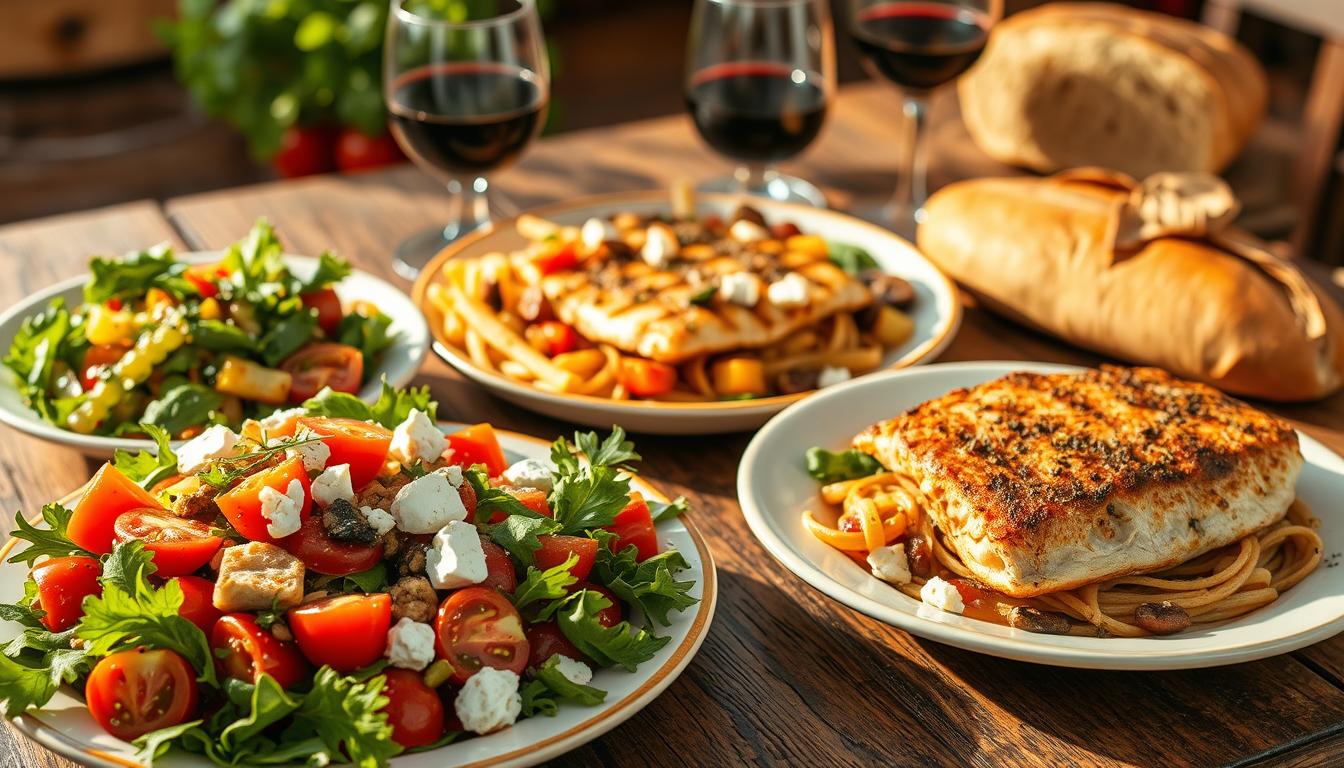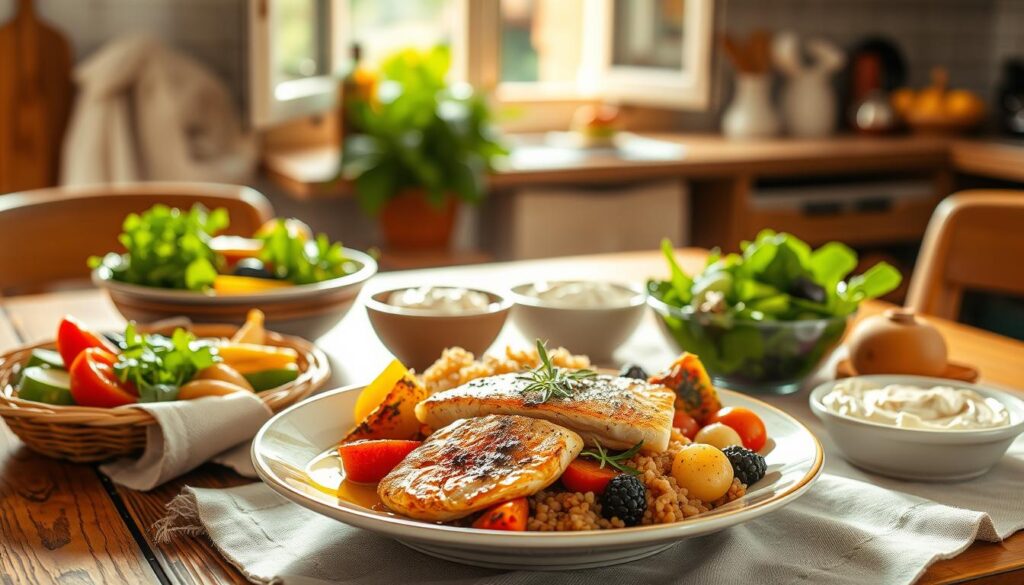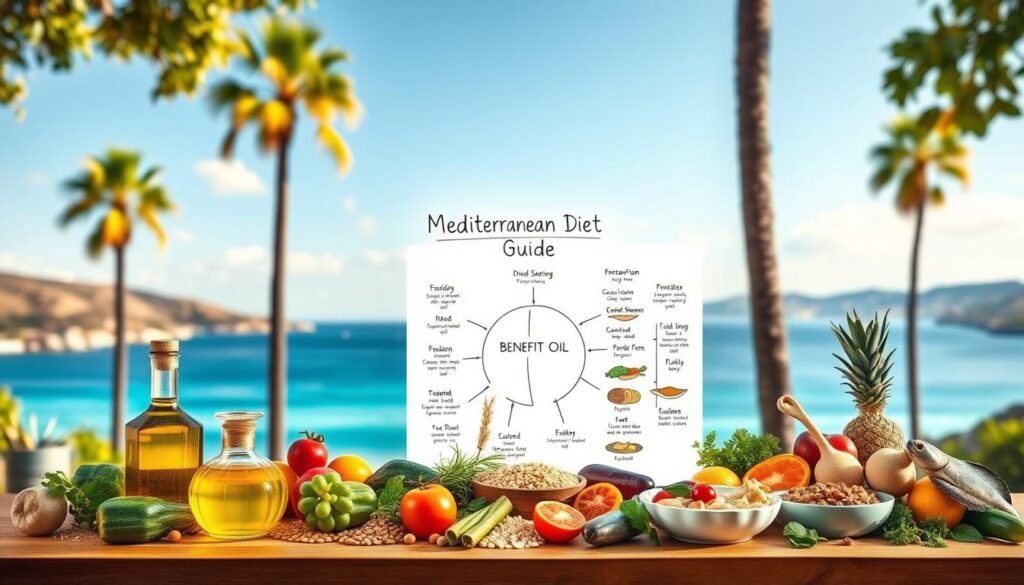Mediterranean Diet for Beginners: Complete 30-Day Starter Guide

Starting a healthy eating journey can be tough. But with the right help, you can do great. The Mediterranean eating style is known for many health perks. It helps with weight and makes you feel better overall.
This 30-day guide will show you how to start a Mediterranean-style meal plan. It’s all about whole grains, fruits, and veggies. This plan gives you lots of protein and fiber. It keeps you full and happy between meals.
Key Takeaways
- Discover a 30-day meal plan tailored to your nutritional needs.
- Learn how to incorporate healthy fats and protein into your meals.
- Explore delicious and nutritious recipes to keep you on track.
- Understand the benefits of a balanced Mediterranean-style eating plan.
- Start your journey to a healthier, more balanced you.
What is the Mediterranean Diet?
The Mediterranean Diet focuses on eating whole, unprocessed foods and healthy fats. It’s more than food; it’s a lifestyle that boosts well-being.
Overview of the Mediterranean Lifestyle
The Mediterranean Diet comes from countries around the Mediterranean Sea. It’s rich in fruits, veggies, whole grains, and healthy fats like olive oil. It’s not just about food; it’s about enjoying meals with loved ones and savoring local produce.
Key aspects of the Mediterranean lifestyle include:
- Emphasis on whole, unprocessed foods
- High consumption of fruits and vegetables
- Inclusion of healthy fats, such as olive oil and nuts
- Regular consumption of whole grains
- Enjoying meals with others
Key Ingredients and Foods
The Mediterranean Diet is full of nutritious and tasty foods. Key ingredients include:
- Olive oil as the primary source of fat
- Fresh fruits and vegetables
- Whole grains, such as brown rice, quinoa, and whole-wheat bread
- Legumes, including lentils, chickpeas, and fava beans
- Nuts and seeds, like almonds and pumpkin seeds
- Herbs and spices for flavor instead of salt
These foods are not only delicious but also full of nutrients that support health.
Health Benefits of Following This Diet
The Mediterranean Diet has been studied a lot. It’s linked to many health benefits. By following this diet, you can:
- Reduce your risk of cardiovascular disease
- Support a healthy weight
- Lower your risk of certain cancers
- Improve your overall well-being
Health experts say, “The Mediterranean Diet is a well-rounded eating plan. It has many health benefits, making it a great choice for improving health.”
“The Mediterranean Diet is not just a diet; it’s a way of living that combines healthy eating with a positive lifestyle.”
By embracing the Mediterranean Diet, you’re not just changing your eating habits. You’re adopting a lifestyle that promotes health, well-being, and enjoying food.
Getting Started with the Mediterranean Diet
Starting the Mediterranean Diet is easy if you know the basics. You’ll learn about pantry staples and meal planning. It’s more than just a diet; it’s a healthier lifestyle.
Essential Pantry Staples
First, stock your pantry with healthy items. Olive oil is key, full of healthy fats. You’ll also need whole grains like brown rice and whole-wheat bread for fiber and nutrients.
Canned beans, like chickpeas, are a must for protein and fiber. Nuts and seeds, like almonds, add crunch and antioxidants.

Meal Planning Tips
Meal planning is crucial for the Mediterranean Diet. Plan meals with seasonal produce for freshness and variety. Mix vegetables, fruits, whole grains, and lean proteins in your meals.
Try batch cooking on weekends for the week. Prep ingredients like chopping veggies to make meals quicker.
- Plan meals around seasonal produce.
- Incorporate a variety of food groups.
- Consider batch cooking.
Understanding Portion Sizes
Knowing portion sizes is key for a healthy weight and nutrients. The Mediterranean Diet is about balance, not deprivation. Watch serving sizes for nuts, oils, and grains.
Use a food scale or measuring cups for accurate portions. You’ll learn what’s right over time, enjoying meals without overeating.
Focus on these areas to adopt the Mediterranean Diet successfully. It improves your health and makes food more enjoyable.
A 30-Day Meal Plan: Week 1
Start your Mediterranean diet journey with our Week 1 meal plan. It introduces you to the diet’s flavors and benefits. This plan focuses on whole grains, fruits, and vegetables for a balanced diet.
Breakfast Ideas
Begin your day with a healthy breakfast. Try Greek yogurt with berries and granola, or scrambled eggs with spinach and whole-grain toast. These Mediterranean diet recipes for beginners are simple and tasty.
- Greek yogurt parfait with berries and granola
- Avocado toast on whole-grain bread with scrambled eggs
- Oatmeal with sliced banana and a drizzle of honey
Lunch Options
For lunch, enjoy a salad with grilled chicken, mixed greens, cherry tomatoes, and citrus vinaigrette. Or, try a whole-grain pita with hummus, cucumber, and tomato for a filling meal.
- Grilled chicken salad with mixed greens and citrus vinaigrette
- Whole-grain pita with hummus, cucumber, and tomato
- Quinoa and black bean bowl with roasted vegetables
Dinner Recipes
Dinner with the Mediterranean diet is both flavorful and healthy. Try grilled salmon with roasted vegetables and quinoa, or a hearty lentil soup with whole-grain bread.
- Grilled salmon with roasted vegetables and quinoa
- Lentil soup with a side of whole-grain bread
- Grilled chicken with roasted sweet potatoes and green beans
Snack Suggestions
Snacking on the Mediterranean diet is easy and healthy. Enjoy almonds, fresh fruit, or carrot sticks with hummus. These snacks are tasty and full of nutrients.
- Almonds and dried fruit
- Carrot sticks with hummus
- Fresh fruit salad
By following this Week 1 meal plan, you’ll start enjoying the Mediterranean diet’s benefits. Stay tuned for Week 2, with more delicious and nutritious recipes to keep your meals exciting.
A 30-Day Meal Plan: Week 2
Week 2 of our 30-day meal plan is here. It brings you tasty and healthy recipes. You’ll explore Mediterranean diet flavors with whole grains, fruits, and veggies.

Breakfast Ideas
Start your day with a healthy breakfast. Try oatmeal with fruit and nuts. It’s a Mediterranean favorite that’s both tasty and filling.
Avocado toast with scrambled eggs is another great choice. It gives you healthy fats and protein to stay energized.
Other breakfast ideas include Greek yogurt with honey and walnuts. Or a smoothie bowl with your favorite fruits and granola on top.
Lunch Options
For lunch, try a whole grain pita with hummus and veggies. It’s simple yet satisfying, full of fiber and vitamins. Or go for a quinoa salad with grilled chicken, cherry tomatoes, and lemon-tahini dressing. It’s tasty and full of nutrients.
Dinner Recipes
Dinner can be exciting too. How about grilled chicken with roasted sweet potatoes and steamed broccoli? It shows the Mediterranean diet’s focus on lean proteins and colorful veggies.
Or, you might like lentil soup with whole grain bread. It’s comforting and nutritious, perfect for a weeknight dinner.
These dinner recipes are easy to make and fun for the whole family. They help you stay on track with your Mediterranean diet meal plan.
A 30-Day Meal Plan: Week 3
You’re now in Week 3 of your Mediterranean diet meal plan. This week, you’ll enjoy many delicious meals. They are easy to make and full of nutrients.
Breakfast Ideas
Start your day with a healthy breakfast. Try a smoothie bowl with Greek yogurt, fresh fruits, and granola. Or, have whole grain waffles with berries and whipped cream.
- Greek yogurt parfait with honey and walnuts
- Avocado toast on whole grain bread with a fried egg
- Oatmeal with sliced banana and almond butter
Lunch Options
For lunch, try a grilled chicken salad with mixed greens, cherry tomatoes, and a light dressing. Or, have a whole grain pita with hummus, cucumber, and tomato.
- Grilled chicken wrap with roasted vegetables
- Quinoa salad with roasted vegetables and feta cheese
- Lentil soup with whole grain bread
Dinner Recipes
Dinner can be simple, like baked salmon with roasted asparagus and quinoa. Or, try grilled shrimp with steamed broccoli and brown rice.
- Baked chicken thighs with roasted sweet potatoes and green beans
- Vegetarian stuffed bell peppers with quinoa and black beans
- Grilled turkey burgers with avocado and sweet potato fries
Snack Suggestions
Stay energized with healthy snacks. Enjoy fresh fruits and raw vegetables with hummus. Or, have a handful of almonds or a small piece of dark chocolate.
A 30-Day Meal Plan: Week 4
Week four of the Mediterranean diet meal plan offers new healthy breakfast, lunch, and dinner ideas. This diet is more than just food. It’s about living a healthy lifestyle and enjoying every meal.
Breakfast Ideas
Begin your day with a healthy breakfast. Try overnight oats with fruit and nuts for a mix of fiber and protein. Or, enjoy whole grain toast with almond butter and banana slices for lasting energy.
Lunch Options
For lunch, choose whole grain pasta with marinara sauce and sautéed vegetables. It’s both tasty and good for you. Or, go for a grilled chicken salad with mixed greens, cherry tomatoes, and lemon-tahini dressing. It’s refreshing and packed with protein.
Dinner Recipes
Dinner can be exciting too. Try baked cod with roasted Brussels sprouts and sweet potatoes. It’s full of omega-3s and fiber. Or, enjoy grilled chicken with roasted bell peppers and quinoa. It’s a flavorful and nutritious dish.
These meals will please your taste buds and help you reach your health goals. The Mediterranean diet is all about making choices that are good for you and enjoyable for life.
Grocery Shopping for the Mediterranean Diet
Following the Mediterranean Diet starts with the right foods in your kitchen. A good grocery trip is key. Focus on fresh, seasonal produce and whole grains for a healthier diet.
Best Markets to Visit
Local farmers’ markets are great for fresh produce. They offer fruits and veggies in season for the best taste and nutrition. You can also meet local farmers and learn about your food’s origin.
At big grocery stores, check the produce section for a wide variety. Many stores also have international items for Mediterranean recipes.
Seasonal Produce Guide
Buying seasonal produce saves money and ensures freshness. Here’s a quick guide for Mediterranean Diet-friendly produce:
- Spring: Artichokes, asparagus, and strawberries
- Summer: Tomatoes, zucchini, and bell peppers
- Fall: Pumpkins, kale, and apples
- Winter: Citrus fruits, broccoli, and root vegetables
Tips for Smart Shopping
Here are some mediterranean diet tips for smart shopping:
- Plan meals ahead to avoid waste.
- Start with the store’s perimeter for fresh items.
- Buy grains, nuts, and dried fruits in bulk.
- Check labels for added sugars, salt, and unhealthy fats.
By following these mediterranean diet food list tips, you can keep a balanced diet. This diet is based on the Mediterranean way of eating.
Common Misconceptions About the Mediterranean Diet
The Mediterranean Diet has many myths that need to be cleared up. It’s important to know the truth to get the most from this diet.

Healthy Fats: Not a Dietary Villain
Many think the Mediterranean Diet is bad because it has fats. But, it’s all about healthy fats from olive oil, nuts, and fish. These fats are good for your heart and help with weight.
Olive oil is key in the Mediterranean Diet. It’s full of antioxidants and fights inflammation. Adding healthy fats makes the diet better.
The Truth About Carbohydrates
Some think the Mediterranean Diet doesn’t have carbs. But, it’s all about whole grains, fruits, and veggies. These carbs give you energy and are full of fiber and vitamins.
- Whole grains like quinoa and brown rice
- Fruits such as apples and berries
- Vegetables including leafy greens and tomatoes
Eating a variety of these foods lets you enjoy the Mediterranean diet without feeling left out.
The Role of Wine: Moderation is Key
Wine in the Mediterranean Diet is often misunderstood. It’s not about drinking a lot. Just a little red wine is good because of its resveratrol.
“Moderation is key when it comes to wine consumption. Enjoying a glass with meals can be part of a healthy Mediterranean Diet.”
Following a Mediterranean diet guide means making lifestyle changes, not just diet ones. Knowing the truth helps you get the most from this diet.
Tips for Staying Motivated
Starting the Mediterranean Diet is more than just changing what you eat. It’s about changing how you think about health and wellness. Staying motivated is key to reaching your goals.
Achievable Milestones
Setting realistic goals is the first step to success on the Mediterranean Diet. Start by setting achievable milestones, like eating more fruits and veggies or eating less processed food. Having clear, reachable goals helps you stay on track.
- Plan your meals ahead to meet your diet goals.
- Slowly add new foods and recipes to keep things interesting.
- Watch your progress and change your goals if needed.
Monitoring Your Success
Tracking your progress is important to stay motivated on the Mediterranean Diet. Keep a food diary or use a mobile app to record your meals and weight loss. Seeing your progress can really motivate you.
Community Support
Being part of a community can give you the support and motivation you need. Look for online forums or local groups where you can share recipes and tips with others on the same journey.
- Share your favorite Mediterranean Diet recipes with the group.
- Ask for advice and support when you need it.
- Celebrate your successes with your community to stay motivated.
By using these tips, you’ll be on your way to a healthy lifestyle with the Mediterranean Diet. Stay inspired, stay motivated, and enjoy the journey to a healthier you.
Success Stories and Testimonials
Starting your Mediterranean diet journey can be exciting. You’ll hear from many who have seen big health wins and lost weight. They followed the Mediterranean diet and saw amazing changes.
Transformative Experiences
Real people have changed their lives with this diet. They talk about how it made them feel better overall.
Health Benefits Achieved
This diet does more than help you lose weight. It also makes your heart healthier. By eating like the Mediterranean diet, you can feel better too.
Let these stories motivate you. They show the good things you can get from the Mediterranean diet.
